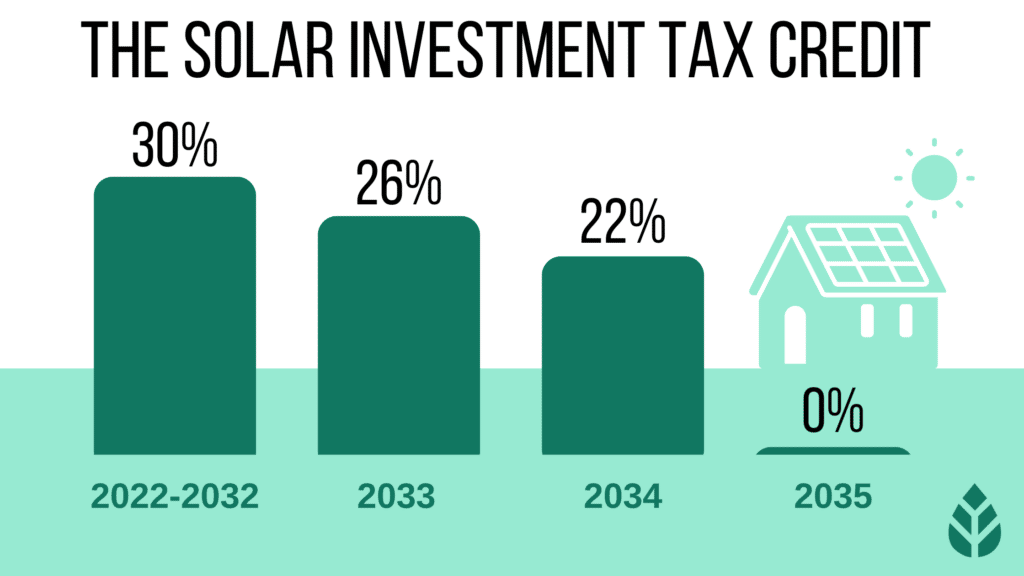 Reviews
Reviews
Florida Solar Incentives (Rebates, Tax Credits & More in 2024)
In this guide to the solar incentive programs and rebates available in Florida, you’ll learn:
- How do the solar incentives in Florida help save you money on your system?
- How do you file for the federal tax credit in Florida to ensure you get the maximum credit amount?
- What are the best solar benefit programs that you shouldn’t miss out on in Florida?
Each product and or company featured here has been independently selected by the writer. You can learn more about our review methodology here. If you make a purchase using the links included, we may earn commission.
Do Florida Solar Incentives Make It Affordable for Homeowners to Go Solar?
Converting to solar power in Florida is expensive, typically averaging around $34,960 for most residents. While solar panel systems in the area usually pay for themselves and then save an additional $40,676 on energy bills, many homeowners still struggle to justify spending nearly $35,000 on their photovoltaic (PV) equipment.
Thankfully, there are available solar incentive programs that can help reduce the cost of converting to solar. With just one tax credit, the average effective cost of solar panels can drop from $34,960 to a much more reasonable $24,472.
The average system price of solar in Florida is above the national average, and the incentives aren’t as appealing as they are in many other states — likely because the state has no Renewable Portfolio Standard (RPS) goal.
Still, the incentives that are available can help bring your upfront and long-term costs down, and they make solar panels far more worthwhile in Florida.

Blue Raven Solar
Pros
- Industry-leading in-house financing
- Competitive pricing
- Excellent reputation
Cons
- Doesn't offer solar batteries (coming 2022)

Momentum Solar
Pros
- Great warranty coverage
- Concierge service ensures steady communication
- Representatives are experts on local policies
Cons
- Slightly limited service offerings
- Only available in 11 states
In the table below, we’ll include a list of all of the federal, state and local incentives that are available to Floridians. We’ll also explain how each of these perks works and how to take advantage of them in the sections below the table.
| Solar Incentives in Florida | Incentive Type | Description | Occurrence | Estimated Dollar Amount You Can Save |
| Federal Solar Investment Tax Credit (ITC) | Federal | Credits 30% of your entire system price to your income tax burden for the tax year your system is commissioned | One time: Gets applied when you file your taxes for the year your system is installed | $10,488 via tax credits on average in Florida |
| Florida Property-Assessed Clean Energy (PACE) Financing | State | Affordable and accessible solar loan options that add your monthly payments to your tax bill | One time: Gets applied when you qualify for the program before you install your system | Varies based on your system size, your monthly energy bills prior to converting and more |
| Florida Sales Tax Exemption/Exclusion | State | Waives all sales tax on PV equipment, including panels, inverters, batteries and more | One time: Gets applied when you purchase your system | $2,097 on average in Florida |
| Florida Property Tax Abatement for Renewable Energy Property/Property Tax Exemption | State | Prevents your property taxes from going up after installing PV equipment, which normally raises your property value | Ongoing: Your system value is left out of your home’s assessed value every year your property taxes are assessed | Varies based on your system value, your home value, your county’s tax rate and more |
| Net metering | Local | Lets you earn credits with excess solar energy that can pay down future utility bills | Ongoing: Always in effect | Varies based on your system size, your monthly energy bills, your energy consumption and more |
| Local Incentives | Local | Special perks and solar rebate programs offered by utility companies and municipalities throughout Florida | Varies | Varies based on the incentive |
What Do Floridians Need to Know About the Federal Solar Tax Credit?
The federal solar investment tax credit (ITC) is the most substantial financial incentive available for PV systems in Florida. It’s offered by the federal government and is available to all Florida homeowners.
The federal credit is for 30% of your entire system cost. In Florida, where residents pay an average of $34,960 for an average 11.5 kilowatt (kW) system, the credit amount comes out to around $10,488.
This amount gets applied to the income taxes you owe for the year your system is installed. If you can’t take the full credit that year, you can roll over any remaining credit for up to five years.
The federal credit was originally offered in 2005 according to the following rate schedule:
- 30% of the system value for systems installed between 2005 and 2021
- 26% of the system value for systems installed in 2022
- 22% of the system value for systems installed in 2023
- 0% of the system value for systems installed in 2024 and beyond
Thankfully, in 2022, the solar credit was extended due to the Inflation Reduction Act (IRA) and increased back up to 30%. It’s now available according to the following rate schedule:
- 30% of the system value for systems installed between 2022 and 2032
- 26% of the system value for systems installed in 2032
- 22% of the system value for systems installed in 2033
- 0% of the system value for systems installed in 2034 and beyond
How to Claim the Federal ITC in Florida
The federal credit provides a massive benefit for many solar customers, and that upside is compounded by the fact that filing for the credit takes just a few minutes and minimal effort. You can follow the simple steps below to make sure you take advantage of this perk.
- Step 1: When it’s time to file your taxes for the year your system was installed, go to the IRS’s website and print out form 5695.
-
- Step 2: Fill out the form. You’ll need the contact information for the Florida solar panel installation company you hired to install your panels, and you’ll also need some basic information about what equipment was installed on your home. You may need to reach out to your solar company for the system size and value.
- Step 3: File the IRS form when you file your taxes or have your accountant file it for you.
If you use tax software like HR Block or TurboTax, the program should automatically prompt you for information about solar conversion. Just report that you did install solar, and the software will ask you for all of the pertinent information instead of having you go to the IRS’s website.
EcoWatch’s Opinion on the Federal ITC in Florida
The federal credit is the single most helpful incentive available in Florida, and it’s the one we recommend taking advantage of over all others. It takes just a few minutes to file for, and it provides an average value of over $10,450, so it’s well worth your time.
Just keep in mind that the federal credit is not a rebate, so you’re not guaranteed to get the entire amount back. Instead, the credit amount gets applied to any income tax that you owe, which means if you don’t owe money on your taxes, you won’t be able to take the credit.
If you owe a portion of the credit, your tax liability should drop to $0, and the remaining credit will roll over for up to five years. As such, you’ll only be able to take the full credit if you expect to owe at least $2,097 per year in income taxes.
What You Need to Know About the Florida Property-Assessed Clean Energy (PACE) Financing
PACE financing is a solar loan program offered by the state of Florida. Rather than a traditional loan, this program requires a minimal down payment and keeps interest rates below the market average. It also seeks to make loan repayment as simple as possible by adding your monthly payment to your tax bill.
The goal of PACE financing is to make solar financing accessible to demographics found typically ineligible, and it’s really geared more toward lower-income households. However, eligibility is open to all Florida residents.
The average savings you can enjoy with this program are hard to calculate because there are so many moving parts and factors that can affect your system total, financing costs and long-term system totals. However, the average savings for a financed system in Florida totals around $35,500, so this is about what you can expect to see in lifetime energy savings from solar.
How to Claim the Florida PACE Financing
Filing for PACE financing is simple, but the entire process will take some time and effort on your part. You can follow the steps below to get set up with your PACE loan in Florida.
- Step 1: Head over to FloridaPace.gov and click “Apply Now” to begin the process.
- Step 2: You’ll need to start by entering some basic contact information, and you’ll eventually have to submit some paperwork to verify the value and location of your home.
- Step 3: You’ll be contacted by the program administrator, who will walk you through the next steps.
- Step 4: Once you’re fully approved, you can move forward with the installation.
EcoWatch’s Opinion on Florida Property-Assessed Clean Energy (PACE) Financing
PACE financing used to be more popular in Florida than it is today because there are now more solar loan options than ever before in Florida. In our opinion, it’s still a good solution for low-income households to convert to solar, but there are some pretty significant downsides to the PACE program that make it a non-ideal option for many homeowners.
First off, solar loans, in general, aren’t as appealing as cash purchases because the interest detracts from your savings and increases the long-term cost of your system.
More importantly, PACE loans add the system total to your tax bill, so if you sell your home before the loan is paid off, the remaining balance would transfer to the new owner. This might be good news for you, but it means your home will likely be less desirable to the new owner, and it may even make your property harder to sell overall.
We’d say this is a decent program for customers who can’t afford or won’t qualify for other payment options, but we’d recommend against it for most Florida property owners.
What You Need to Know About the Sales Tax Exemption in Florida
The sales tax exclusion in Florida waives all sales tax on solar photovoltaic equipment, including panels, inverters, solar batteries, electric vehicle (EV) chargers, racking equipment and the installation costs.
This solar tax exemption is applied at the point of sale, where you’ll save the average state sales tax of 6%.1 With the average system price in the Sunshine State hovering around $34,960 (before any credits or rebates), that’s an average of $2,097 you’ll save on your total system price.
Keep in mind that this is reflected in your total price quoted by your installation company, so you will not get this as a cash-back incentive or tax credit.
How to Claim the Sales Tax Exclusion in Florida
Thankfully, you don’t have to do anything to claim the sales tax exclusion in Florida. The perk is automatically applied to all solar equipment sales, so you simply won’t pay tax on your system installation.
EcoWatch’s Opinion on Florida’s Sales Tax Exclusion
Since you don’t have to do anything to claim it, the sales tax exemption is a great benefit program to claim, as it reduces the all-in cost of installing a solar energy system. Florida’s sales tax is currently 6%, so it can save you well over $2,000 depending on how many solar panels your system needs.
Watch Below: Learn Whether Solar Panels Are Worth it In Florida
What You Need to Know About the Property Tax Exclusion in Florida
The property tax exclusion in Florida prevents your property taxes from increasing as a result of installing solar panels.
Usually, when you carry out a home improvement that boosts your property value, your assessed value and your taxes go up with the value. Converting to solar panels makes your home more valuable — an increase of around 4.1%, on average — but the exemption prevents this from having an effect on your taxes.2
It’s difficult to calculate the dollar amount of this incentive, as it depends on your system value, the value of your home and the tax rate in your area.
With a statewide tax rate average of 0.8% and a typical solar system value of $34,960 in Florida, it’s expected that this perk will save you around $279 per year on your tax bill.3 Over the life of your system — an estimated 20+ years — that comes out to a total savings of approximately $55,93.
How to Claim the Property Tax Exclusion in Florida
Much like the sales tax perk, the property tax exclusion for PV equipment in Florida doesn’t require any work on your part. Normally, the tax assessor in your area would re-evaluate your property’s assessed value based on improvements made — sometimes determined based on building permits.
In the case of solar conversion, the process is as follows:
- Your tax assessor re-evaluates your property value
- The value of the equipment installed will simply be excluded from your property assessment, so it will have no bearing on the assessed value of your home
- Your property taxes remain unchanged due to solar installation
EcoWatch’s Opinion on Florida’s Property Tax Exemption
Over time, the property tax exemption can be a great perk, saving over $5,500 on average in Florida. We love this incentive because it takes no effort on your part, and you’ll simply enjoy the savings on your tax bills.
Net Metering in Florida
Net metering — also called net energy metering or just NEM — is a policy that lets electricity travel back and forth between your home and the electric grid through interconnection. When your panels produce more than you consume (during peak daylight hours) and you send energy to the grid, NEM credits you for the excess energy.
Those credits can be applied to future electric bills, so you can reduce your bills even when your solar production is lower than your energy consumption. The Florida Public Utilities Commission (PUC) mandates net energy metering throughout the state, so all homeowners should have access to the program.
Best of all, the PUC requires that monthly net energy metering credits be equal to the full retail rate. That means every additional kilowatt-hour (kWh) you generate will offset exactly one kWh you pull from the grid. This is the case whether you are serviced by Duke Energy, Florida Power & Light (FPL) or another utility provider. Any excess credits you have at the end of the calendar year will be credited at an avoided-cost rate.
This is the best-case scenario for solar customers, leads to the highest long-term savings and helps reduce your panel payback period.
It’s important to note that net energy metering programs have been changing across the country, so it’s possible that the program in Florida will become less desirable over time. If it does change, the credit rate would likely drop to a less beneficial avoided-cost rate.
Most recently, Governor Ron DeSantis vetoed an attempt to lower the net metering rate back in April of 2022.4
How to Enroll in Net Energy Metering in Florida
Enrolling in net energy metering often requires no work on the homeowner’s end in Florida. Florida solar installation companies have to apply for interconnection with your local utility company and arrange an inspection. If you have a bi-directional meter installed already — which many utility providers are offering automatically — then NEM will then simply take effect if and when your panels send energy to the grid.
To double-check, though, you can always follow the steps below.
- Step 1:Contact your utility provider to ask if you have the proper meter to take advantage of net energy metering. If you don’t, your electric company should install one.
- Step 2: Proceed with installing and commissioning your solar panel system.
- Step 3: Although not necessary, it’s a good idea to monitor your electric bills for a few months after your system is installed to confirm that you’re getting credited for your solar production. If you’re not, you may need to call your installer to report the issue.
EcoWatch’s Opinion on the Net Metering Program in Florida
The net energy metering program in Florida is outstanding for solar customers, especially since it takes minimal effort on your part to enroll.
Florida doesn’t have much in the way of solar system incentives compared to other states, but it does offer the best-case scenario in terms of NEM: the full retail value for all excess energy. That helps you pay off your panels more quickly and maximize your return on investment by helping to reduce your energy bills year-round.
NEM is especially helpful in Florida because residents in the area consume more electricity than most Americans — an average of 1,142 kWh as compared to the national average of 881 kWh.5 Net metering can help you reduce the effective consumption or cover it entirely with solar energy.
Local Solar Incentives in Florida
In addition to the federal and state incentives mentioned above, there are a handful of local perks offered by utility companies and municipalities throughout Florida. We’ll include a complete list of local benefit programs below, along with a brief description of each.
- Jacksonville Solar Battery Storage Rebate Program:Jacksonville residents can get up to $2,000 in rebates for installing a solar energy storage system along with their panels.6
- Boynton Beach Energy Edge Rebate Program: Residents of Boynton Beach can get up to $1,500 in rebates for installing solar PV equipment. There are additional cash-back incentives for other energy-efficiency home improvements, including up to $500 back for EV charger installations.7
- Dunedin Solar Energy Rebate Grant Program: Homeowners in Dunedin can apply for this solar grant, which provides cash-back incentives of up to $0.25 per watt installed or $2,500 total, whichever is lower.8
- City of Lauderhill Revolving Loan Program: The City of Lauderhill provides low-interest loans for PV equipment for up to $2,500. This is also available for Energy Star appliances and other efficiency upgrades.9
- Orlando Utilities Commission Residential Energy Efficiency Rebate Program: Residents in this city can get rebates of up to $2,000 for battery installations.10
- Lakeland Electric Residential Battery Rebate: Customers of Lakeland Electric can get up to a 50% rebate — up to $1,000 — for solar battery installation.11
- City of Tallahassee Utilities Solar Loans: Tallahassee provides low-interest, no-down-payment loan options for PV equipment.12 Loan amounts can be as high as $20,000.
Which Tax Incentives Are the Best in Florida?
Above, we’ve discussed all of the incentives and solar perks available to Florida property owners, but not all of these programs are as valuable as others. Below, we’ll include what we believe are the most valuable perks available and why we recommend taking these over the other options if you’re tight on time to apply.
Federal Tax Credit
The one incentive we absolutely recommend not missing out on in Florida is the federal credit, and this is the perk we’d suggest applying for if you only take one. Applying for the credit takes minimal time and effort on your part, as it only requires a single form and takes just a few minutes to fill out.
Despite how easy it is to apply for, the federal credit provides the greatest potential for effective savings on your PV system. In Florida, if you can take the full credit, you’ll effectively save over $10,450 on average, which is massive.
Just remember that this credit is not a rebate, and the full amount is only guaranteed if you’ll owe the credit total or more in income taxes over the next five years.
Florida Net Metering
Net energy metering is another outstanding perk in Florida. Not only does it take most residents no time or effort to take advantage of, but it also can help maximize your savings, shorten your panel payoff period and reduce your energy bills month after month.
Right now, the net energy metering policy in Florida is extremely valuable, as the monthly excess energy you produce is credited at the full retail rate. This is subject to change in the future, so it’s best to act now. If the policy changes, any installations occurring prior to the change will be grandfathered in under the preexisting rate.
Local Rebates
Finally, we suggest taking any and all local cash-back incentives that you can. Depending on where you live and the company that provides you with electricity, you may be able to take multiple rebates. We’ll list the available local rebate programs below that we suggest looking into. These have minimal application requirements and can save you thousands.
- Jacksonville Solar Storage Rebate Program
- Boynton Beach Energy Edge Rebate Program
- Dunedin Solar Energy Rebate Grant Program
- Orlando Utilities Commission Residential Energy Efficiency Rebate Program
- Lakeland Electric Residential Battery Rebate
What Florida Property Owners Need To Know About SRECs / TRECs?
Solar Renewable Energy Certificates (SRECs) are credits that solar customers can earn for their solar production. In states with an active SREC market, customers usually earn one credit for every 1,000 kWh of production (1 megawatt-hour). Those credits can then be sold for a profit to help pay off your panels.
Unfortunately, Florida currently does not have an active SREC market, so these energy credits are not available in the area.
What’s The Near Term Outlook For More Incentives In Florida?
At this time, there are no initiatives to bring additional incentives to Florida. The Sunshine State is one of the few that doesn’t have an RPS goal, which usually serves as an impetus for additional incentives. If Florida does implement an RPS goal in the future, the likelihood is that more incentives will follow. However, there is currently no plan to implement one.
The cost information presented in this article is derived from a comprehensive analysis, incorporating data from multiple industry sources. The average cost per watt per state was calculated based on figures from Consumer Affairs, Energy Sage, and Berkeley Lab’s Electricity Markets & Policy Department. Additionally, monthly energy consumption and the average monthly cost of electricity were sourced from the U.S. Energy Information Administration, ensuring a well-rounded and accurate representation of the information presented.
FAQ
Given the popularity of solar in Florida, we get lots of questions about how to save money on equipment with the available incentives in the area. Below, we’ll provide answers to some of the questions we see most commonly.
At this time, there are no plans or pieces of legislation proposed to increase the incentives available in Florida in the next two years. If Florida does set an RPS goal in that timeframe, then we might see incentives added to help the state reach its goals. However, there’s currently no evidence that an RPS goal is in the works.
The Inflation Reduction Act of 2022 made two crucial changes for solar energy and renewable energy in general.
First, it extended the federal credit by ten years, and it increased the credit rate back up to the previous rate of 30%. This is an important change that could save Florida property owners an average of $10,488 on solar installations.
Second, it added additional perks for electric vehicle purchases. The maximum tax incentive was bumped up to $7,500 per EV. It’s important to remember that solar panels on your home also serve as a gas station for EVs, adding thousands of dollars to the potential savings they can provide.
There are currently no plans for solar programs to decrease or become less beneficial in the next two months in Florida.
If something were to get less appealing, it would likely be the net energy metering program. NEM is currently mandated for all utility companies at the retail rate. This is the best-case scenario. Unfortunately, many states are seeing changes to NEM policies, so it’s possible that Florida will adopt a less beneficial avoided-cost rate like other states are doing.
However, as mentioned above, Florida currently doesn’t have an RPS goal. If the state does set one, chances are high that the incentives will become more beneficial rather than less beneficial.
Based on Florida being ranked third in the nation for solar adoption, according to the Solar Energy Industries Association (SEIA), we would guess that the state will move to set an RPS goal in the future.13 Generally speaking, the outlook for solar in Florida is quite good.
Top Solar Installers in Florida Cities
Comparing authorized solar partners
-
- Industry-leading in-house financing
- Competitive pricing
- Excellent reputation
- Doesn't offer solar batteries (coming 2022)
A+Best Solar Financing2014Trina Solar, Canadian Solar, SolarEdge, Silfab, SunPower25-year manufacturer warranty; 10-year workmanship warranty, 2-year production guarantee
Having trouble deciding? Click below and use our process to receive multiple quotes instead:

 233k
233k  41k
41k  Subscribe
Subscribe 









